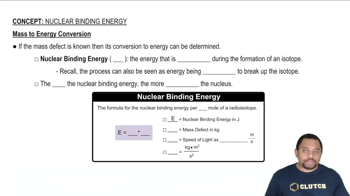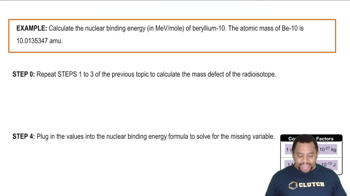Nuclear Binding Energy definitions Flashcards
 Back
BackNuclear Binding Energy definitions
1/10
Terms in this set (10)
- Nuclear Binding EnergyEnergy released during isotope formation or absorbed during its breakup, indicating nucleus stability.
- Mass DefectDifference in mass between a nucleus and its constituent nucleons, crucial for energy calculations.
- IsotopeVariant of an element with the same number of protons but different numbers of neutrons.
- NucleusCentral part of an atom, composed of protons and neutrons, determining atomic stability.
- RadioisotopeIsotope with an unstable nucleus, undergoing radioactive decay to reach stability.
- JouleUnit of energy in the International System, equivalent to kilograms times meters squared per seconds squared.
- KilogramBase unit of mass in the International System, used in energy calculations involving mass defect.
- Speed of LightConstant value of 3.00 x 10^8 meters per second, used in energy-mass conversion equations.
- Einstein's EquationFormula E=mc^2, relating mass defect to energy, fundamental in nuclear chemistry.
- StabilityCondition of a nucleus being less likely to undergo radioactive decay, linked to binding energy.


